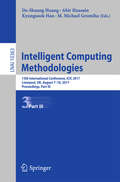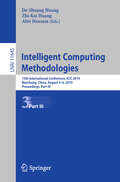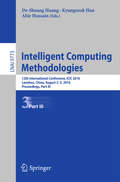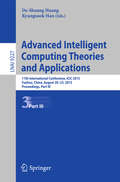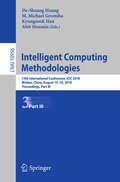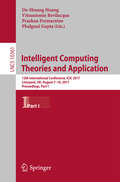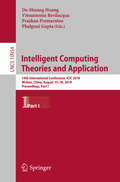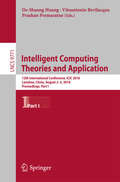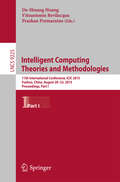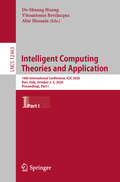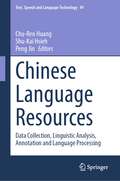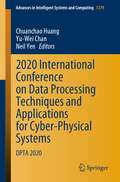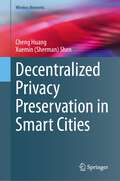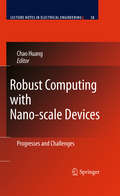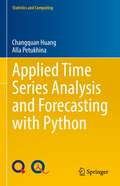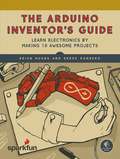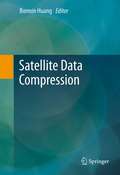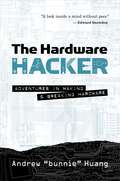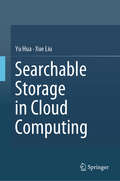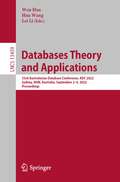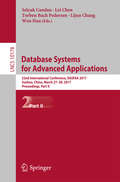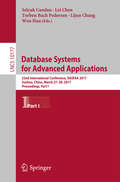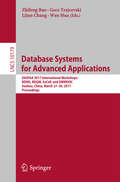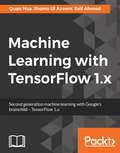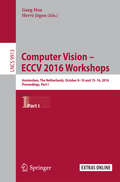- Table View
- List View
Intelligent Computing Methodologies
by De-Shuang Huang Abir Hussain Kyungsook Han M. Michael GromihaThis book - in conjunction with the volumes LNCS 8588 and LNBI 8590 - constitutes the refereed proceedings of the 10th International Conference on Intelligent Computing, ICIC 2014, held in Taiyuan, China, in August 2014. The 85 papers of this volume were carefully reviewed and selected from numerous submissions. The papers are organized in topical sections such as soft computing; artificial bee colony algorithms; unsupervised learning; kernel methods and supporting vector machines; machine learning; fuzzy theory and algorithms; image processing; intelligent computing in computer vision; intelligent computing in communication networks; intelligent image/document retrievals; intelligent data analysis and prediction; intelligent agent and Web applications; intelligent fault diagnosis; knowledge representation/reasoning; knowledge discovery and data mining; natural language processing and computational linguistics; next gen sequencing and metagenomics; intelligent computing in scheduling and engineering optimization; advanced modeling, control and optimization techniques for complex engineering systems; complex networks and their applications; time series forecasting and analysis using artificial neural networks; computer human interaction using multiple visual cues and intelligent computing; biometric system and security for intelligent computing.
Intelligent Computing Methodologies: 15th International Conference, ICIC 2019, Nanchang, China, August 3–6, 2019, Proceedings, Part III (Lecture Notes in Computer Science #11645)
by De-Shuang Huang Zhi-Kai Huang Abir HussainThis two-volume set of LNCS 11643 and LNCS 11644 constitutes - in conjunction with the volume LNAI 11645 - the refereed proceedings of the 15th International Conference on Intelligent Computing, ICIC 2019, held in Nanchang, China, in August 2019. The 217 full papers of the three proceedings volumes were carefully reviewed and selected from 609 submissions.The ICIC theme unifies the picture of contemporary intelligent computing techniques as an integral concept that highlights the trends in advanced computational intelligence and bridges theoretical research with applications. The theme for this conference is “Advanced Intelligent Computing Methodologies and Applications.” Papers related to this theme are especially solicited, including theories, methodologies, and applications in science and technology.
Intelligent Computing Methodologies
by De-Shuang Huang Kyungsook Han Abir HussainThis book - in conjunction with the volumes LNCS 8588 and LNBI 8590 - constitutes the refereed proceedings of the 10th International Conference on Intelligent Computing, ICIC 2014, held in Taiyuan, China, in August 2014. The 85 papers of this volume were carefully reviewed and selected from numerous submissions. The papers are organized in topical sections such as soft computing; artificial bee colony algorithms; unsupervised learning; kernel methods and supporting vector machines; machine learning; fuzzy theory and algorithms; image processing; intelligent computing in computer vision; intelligent computing in communication networks; intelligent image/document retrievals; intelligent data analysis and prediction; intelligent agent and Web applications; intelligent fault diagnosis; knowledge representation/reasoning; knowledge discovery and data mining; natural language processing and computational linguistics; next gen sequencing and metagenomics; intelligent computing in scheduling and engineering optimization; advanced modeling, control and optimization techniques for complex engineering systems; complex networks and their applications; time series forecasting and analysis using artificial neural networks; computer human interaction using multiple visual cues and intelligent computing; biometric system and security for intelligent computing.
Advanced Intelligent Computing Theories and Applications: 11th International Conference, ICIC 2015, Fuzhou, China, August 20-23, 2015. Proceedings, Part III (Lecture Notes in Computer Science #9227)
by De-Shuang Huang Kyungsook HanThis volume, in conjunction with the two volumes LNCS 4681 and LNAI 4682, constitutes the refereed proceedings of the Third International Conference on Intelligent Computing held in Qingdao, China, in August 2007. The conference sought to establish contemporary intelligent computing techniques as an integral method that underscores trends in advanced computational intelligence and links theoretical research with applications.
Intelligent Computing Methodologies: 14th International Conference, ICIC 2018, Wuhan, China, August 15-18, 2018, Proceedings, Part III (Lecture Notes in Computer Science #10956)
by De-Shuang Huang M. Michael Gromiha Kyungsook Han Abir HussainThis book constitutes - in conjunction with the two-volume set LNCS 10954 and LNCS 10955 - the refereed proceedings of the 14th International Conference on Intelligent Computing, ICIC 2018, held in Wuhan, China, in August 2018. The 275 full papers and 72 short papers of the three proceedings volumes were carefully reviewed and selected from 632 submissions. The papers are organized in topical sections such as Evolutionary Computation and Learning; Neural Networks; Pattern Recognition; Image Processing; Information Security; Virtual Reality and Human-Computer Interaction; Business Intelligence and Multimedia Technology; Biomedical Informatics Theory and Methods; Swarm Intelligence and Optimization; Natural Computing; Quantum Computing; Intelligent Computing in Computer Vision; Fuzzy Theory and Algorithms; Machine Learning; Systems Biology; Intelligent Systems and Applications for Bioengineering; Evolutionary Optimization: Foundations and Its Applications to Intelligent Data Analytics; Swarm Evolutionary Algorithms for Scheduling and Combinatorial Optimization; Swarm Intelligence and Applications in Combinatorial Qoptimization; Advances in Metaheuristic Optimization Algorithm; Advances in Image Processing and Pattern Techniques; Bioinformatics.
Intelligent Computing Theories and Application
by De-Shuang Huang Vitoantonio Bevilacqua Prashan Premaratne Phalguni GuptaThe International Conference on Intelligent Computing (ICIC) was formed to provide an annual forum dedicated to the emerging and challenging topics in artificial intel- gence, machine learning, pattern recognition, image processing, bioinformatics, and computational biology. It aims to bring together researchers and practitioners from both academia and industry to share ideas, problems, and solutions related to the m- tifaceted aspects of intelligent computing. ICIC 2010, held in Changsha, China, August 18-21, 2010, constituted the 6th - ternational Conference on Intelligent Computing. It built upon the success of ICIC 2009, ICIC 2008, ICIC 2007, ICIC 2006, and ICIC 2005, that were held in Ulsan, Korea, Shanghai, Qingdao, Kunming and Hefei, China, respectively. This year, the conference concentrated mainly on the theories and methodologies as well as the emerging applications of intelligent computing. Its aim was to unify the picture of contemporary intelligent computing techniques as an integral concept that highlights the trends in advanced computational intelligence and bridges theoretical research with applications. Therefore, the theme for this conference was "Advanced Intelligent Computing Technology and Applications. " Papers focusing on this theme were solicited, addressing theories, methodologies, and applications in science and technology.
Intelligent Computing Theories and Application: 14th International Conference, ICIC 2018, Wuhan, China, August 15-18, 2018, Proceedings, Part I (Lecture Notes in Computer Science #10954)
by De-Shuang Huang Vitoantonio Bevilacqua Prashan Premaratne Phalguni GuptaThis two-volume set LNCS 10954 and LNCS 10955 constitutes - in conjunction with the volume LNAI 10956 - the refereed proceedings of the 14th International Conference on Intelligent Computing, ICIC 2018, held in Wuhan, China, in August 2018. The 275 full papers and 72 short papers of the three proceedings volumes were carefully reviewed and selected from 632 submissions. The papers are organized in topical sections such as Neural Networks.- Pattern Recognition.- Image Processing.- Intelligent Computing in Robotics.- Intelligent Control and Automation.- Intelligent Data Analysis and Prediction.- Fuzzy Theory and Algorithms.- Supervised Learning.- Unsupervised Learning.- Kernel Methods and Supporting Vector Machines.- Knowledge Discovery and Data Mining.- Natural Language Processing and Computational Linguistics.- Gene Expression Array Analysis.- Systems Biology.- Computational Genomics.- Computational Proteomics.- Gene Regulation Modeling and Analysis.- Protein-Protein Interaction Prediction.- Next-Gen Sequencing and Metagenomics.- Structure Prediction and Folding.- Evolutionary Optimization for Scheduling.- High-Throughput Biomedical Data Integration and Mining.- Machine Learning Algorithms and Applications.- Heuristic Optimization Algorithms for Real-World Applications.- Evolutionary Multi-Objective Optimization and Its Applications.- Swarm Evolutionary Algorithms for Scheduling and Combinatorial.- Optimization.- Swarm Intelligence and Applications in Combinatorial Optimization.- Advances in Metaheuristic Optimization Algorithm.- Advances in Image Processing and Pattern Recognition Techniques.- AI in Biomedicine.- Bioinformatics.- Biometrics Recognition.- Information Security.- Virtual Reality and Human-Computer Interaction.- Healthcare Informatics Theory and Methods.- Intelligent Computing in Computer Vision.- Intelligent Agent and Web Applications.- Reinforcement Learning.- Machine Learning.- Modeling, Simulation, and Optimization of Biological Systems.- Biomedical Data Modeling and Mining.- Cheminformatics.- Intelligent Computing in Computational Biology.- Protein Structure and Function Prediction.- Biomarker Discovery.- Hybrid Computational Intelligence: Theory and Application in Bioinformatics, Computational Biology and Systems Biology.- IoT and Smart Data.- Intelligent Systems and Applications for Bioengineering.- Evolutionary Optimization: Foundations and Its Applications to Intelligent Data Analytics.- Protein and Gene Bioinformatics: Analysis, Algorithms and Applications.
Intelligent Computing Theories and Application
by De-Shuang Huang Vitoantonio Bevilacqua Prashan PremaratneThis volume, in conjunction with the two volumes LNCS 4681 and LNAI 4682, constitutes the refereed proceedings of the Third International Conference on Intelligent Computing held in Qingdao, China, in August 2007. The conference sought to establish contemporary intelligent computing techniques as an integral method that underscores trends in advanced computational intelligence and links theoretical research with applications.
Intelligent Computing Theories and Methodologies
by De-Shuang Huang Vitoantonio Bevilacqua Premaratne PrashanThis two-volume set LNCS 9225 and LNCS 9226 constitutes - in conjunction with the volume LNAI 9227 - the refereed proceedings of the 11th International Conference on Intelligent Computing, ICIC 2015, held in Fuzhou, China, in August 2015. The total of 191 full and 42 short papers presented in the three ICIC 2015 volumes was carefully reviewed and selected from 671 submissions. The papers are organized in topical sections such as evolutionary computation and learning; compressed sensing, sparse coding and social computing; neural networks, nature inspired computing and optimization; pattern recognition and signal processing; image processing; biomedical informatics theory and methods; differential evolution, particle swarm optimization and niche technology; intelligent computing and knowledge discovery and data mining; soft computing and machine learning; computational biology, protein structure and function prediction; genetic algorithms; artificial bee colony algorithms; swarm intelligence and optimization; social computing; information security; virtual reality and human-computer interaction; healthcare informatics theory and methods; unsupervised learning; collective intelligence; intelligent computing in robotics; intelligent computing in communication networks; intelligent control and automation; intelligent data analysis and prediction; gene expression array analysis; gene regulation modeling and analysis; protein-protein interaction prediction; biology inspired computing and optimization; analysis and visualization of large biological data sets; motif detection; biomarker discovery; modeling; simulation; and optimization of biological systems; biomedical data modeling and mining; intelligent computing in biomedical signal/image analysis; intelligent computing in brain imaging; neuroinformatics; cheminformatics; intelligent computing in computational biology; computational genomics; special session on biomedical data integration and mining in the era of big data; special session on big data analytics; special session on artificial intelligence for ambient assisted living; and special session on swarm intelligence with discrete dynamics.
Intelligent Computing Theories and Application: 16th International Conference, ICIC 2020, Bari, Italy, October 2–5, 2020, Proceedings, Part I (Lecture Notes in Computer Science #12463)
by De-Shuang Huang Vitoantonio Bevilacqua Abir HussainThis two-volume set of LNCS 12463 and LNCS 12464 constitutes - in conjunction with the volume LNAI 12465 - the refereed proceedings of the 16th International Conference on Intelligent Computing, ICIC 2020, held in Bari, Italy, in October 2020. The 162 full papers of the three proceedings volumes were carefully reviewed and selected from 457 submissions. The ICIC theme unifies the picture of contemporary intelligent computing techniques as an integral concept that highlights the trends in advanced computational intelligence and bridges theoretical research with applications. The theme for this conference is “Advanced Intelligent Computing Methodologies and Applications.” Papers related to this theme are especially solicited, addressing theories, methodologies, and applications in science and technology.
Chinese Language Resources: Data Collection, Linguistic Analysis, Annotation and Language Processing (Text, Speech and Language Technology #49)
by Chu-Ren Huang Shu-Kai Hsieh Peng JinBased on the accumulation of research experience and knowledge over the past 30 years, this volume lays out the research issues posed by the construction of various types of Chinese language resources, how they were resolved, and the implication of the solutions for future Chinese language processing research. This volume covers 30 years of development in Chinese language processing, focusing on the impact of conscientious decisions by some leading research groups. It focuses on constructing language resources, which led to thriving research and development of expertise in Chinese language technology today. Contributions from more than 40 leading scholars from various countries explore how Chinese language resources are used in current pioneering NLP research, the future challenges and their implications for computational and theoretical linguistics.
2020 International Conference on Data Processing Techniques and Applications for Cyber-Physical Systems: DPTA 2020 (Advances in Intelligent Systems and Computing #1379)
by Chuanchao Huang Yu-Wei Chan Neil YenThis book covers cutting-edge and advanced research on data processing techniques and applications for cyber-physical systems, gathering the proceedings of the International Conference on Data Processing Techniques and Applications for Cyber-Physical Systems (DPTA 2020), held in Laibin City, Guangxi Province, China, on December 11–12, 2020. It examines a wide range of topics, including distributed processing for sensor data in CPS networks; approximate reasoning and pattern recognition for CPS networks; data platforms for efficient integration with CPS networks; machine learning algorithms for CPS networks; and data security and privacy in CPS networks. Outlining promising future research directions, the book offers a valuable resource for students, researchers, and professionals alike, while also providing a useful reference guide for newcomers to the field.
Decentralized Privacy Preservation in Smart Cities (Wireless Networks)
by Cheng Huang Xuemin (Sherman) ShenThis book investigates decentralized trust-based privacy-preserving solutions in smart cities. The authors first present an overview of smart cities and privacy challenges and discuss the benefits of adopting decentralized trust models in achieving privacy preservation. The authors then give a comprehensive review of fundamental decentralized techniques and privacy-preserving cryptographic techniques. The next four chapters each detail a decentralized trust-based scheme, focusing respectively on privacy-preserving identity management, cross-domain authentication, data analytics, and data search, in specific use cases. Finally, the book explores open issues and outlines future research directions in the field of decentralized privacy preservation.
Robust Computing with Nano-scale Devices
by Chao HuangRobust Nano-Computing focuses on various issues of robust nano-computing, defect-tolerance design for nano-technology at different design abstraction levels. It addresses both redundancy- and configuration-based methods as well as fault detecting techniques through the development of accurate computation models and tools. The contents present an insightful view of the ongoing researches on nano-electronic devices, circuits, architectures, and design methods, as well as provide promising directions for future research.
Applied Time Series Analysis and Forecasting with Python (Statistics and Computing)
by Changquan Huang Alla PetukhinaThis textbook presents methods and techniques for time series analysis and forecasting and shows how to use Python to implement them and solve data science problems. It covers not only common statistical approaches and time series models, including ARMA, SARIMA, VAR, GARCH and state space and Markov switching models for (non)stationary, multivariate and financial time series, but also modern machine learning procedures and challenges for time series forecasting. Providing an organic combination of the principles of time series analysis and Python programming, it enables the reader to study methods and techniques and practice writing and running Python code at the same time. Its data-driven approach to analyzing and modeling time series data helps new learners to visualize and interpret both the raw data and its computed results. Primarily intended for students of statistics, economics and data science with an undergraduate knowledge of probability and statistics, the book will equally appeal to industry professionals in the fields of artificial intelligence and data science, and anyone interested in using Python to solve time series problems.
The Arduino Inventor's Guide: Learn Electronics by Making 10 Awesome Projects
by Brian Huang Derek RunbergWith Arduino, you can build any hardware project you can imagine. This open-source platform is designed to help total beginners explore electronics, and with its easy-to-learn programming language, you can collect data about the world around you to make something truly interactive.The Arduino Inventor's Guide opens with an electronics primer filled with essential background knowledge for your DIY journey. From there, you’ll learn your way around the Arduino through a classic hardware entry point—blinking LEDs. Over the course of the book, 11 hands-on projects will teach you how to:–Build a stop light with LEDs–Display the volume in a room on a warning dial–Design and build a desktop fan–Create a robot that draws with a motor and pens–Create a servo-controlled balance beam–Build your own playable mini piano–Make a drag race timer to race toy cars against your friendsEach project focuses on a new set of skills, including breadboarding circuits; reading digital and analog inputs; reading magnetic, temperature, and other sensors; controlling servos and motors; and talking to your computer and the Web with an Arduino. At the end of every project, you’ll also find tips on how to use it and how to mod it with additional hardware or code.What are you waiting for? Start making, and learn the skills you need to own your technology!Uses the Arduino Uno board or SparkFun RedBoard
Satellite Data Compression
by Bormin HuangSatellite Data Compression covers recent progress in compression techniques for multispectral, hyperspectral and ultra spectral data. A survey of recent advances in the fields of satellite communications, remote sensing and geographical information systems is included. Satellite Data Compression, contributed by leaders in this field, is the first book available on satellite data compression. It covers onboard compression methodology and hardware developments in several space agencies. Case studies are presented on recent advances in satellite data compression techniques via various prediction-based, lookup-table-based, transform-based, clustering-based, and projection-based approaches. This book provides valuable information on state-of-the-art satellite data compression technologies for professionals and students who are interested in this topic. Satellite Data Compression is designed for a professional audience comprised of computer scientists working in satellite communications, sensor system design, remote sensing, data receiving, airborne imaging and geographical information systems (GIS). Advanced-level students and academic researchers will also benefit from this book.
The Hardware Hacker Adventures in Making and Breaking Hardware
by Andrew Bunnie" HuangFor over a decade, Andrew "bunnie" Huang, one of the world's most esteemed hackers, has shaped the fields of hacking and hardware, from his cult-classic book Hacking the Xbox to the open-source laptop Novena and his mentorship of various hardware startups and developers. In The Hardware Hacker, Huang shares his experiences in manufacturing and open hardware, creating an illuminating and compelling career retrospective. Huang's journey starts with his first visit to the staggering electronics markets in Shenzhen, with booths overflowing with capacitors, memory chips, voltmeters, and possibility. He shares how he navigated the overwhelming world of Chinese factories to bring chumby, Novena, and Chibitronics to life, covering everything from creating a Bill of Materials to choosing the factory to best fit his needs. Through this collection of personal essays and interviews on topics ranging from the legality of reverse engineering to a comparison of intellectual property practices between China and the United States, bunnie weaves engineering, law, and society into the tapestry of open hardware. With highly detailed passages on the ins and outs of manufacturing and a comprehensive take on the issues associated with open source hardware, The Hardware Hacker is an invaluable resource for aspiring hackers and makers.
Searchable Storage in Cloud Computing
by Yu Hua Xue LiuThis book presents the state-of-the-art work in terms of searchable storage in cloud computing. It introduces and presents new schemes for exploring and exploiting the searchable storage via cost-efficient semantic hashing computation. Specifically, the contents in this book include basic hashing structures (Bloom filters, locality sensitive hashing, cuckoo hashing), semantic storage systems, and searchable namespace, which support multiple applications, such as cloud backups, exact and approximate queries and image analytics. Readers would be interested in the searchable techniques due to the ease of use and simplicity. More importantly, all these mentioned structures and techniques have been really implemented to support real-world applications, some of which offer open-source codes for public use. Readers will obtain solid backgrounds, new insights and implementation experiences with basic knowledge in data structure and computer systems.
Databases Theory and Applications: 33rd Australasian Database Conference, ADC 2022, Sydney, NSW, Australia, September 2–4, 2022, Proceedings (Lecture Notes in Computer Science #13459)
by Wen Hua Hua Wang Lei LiThis book constitutes the refereed proceedings of the 33rd International Conference on Databases Theory and Applications, ADC 2022, held in Sydney, Australia, in September 2022. The conference is co-located with the 48th International Conference on Very Large Data Bases, VLDB 2022. The 9 full papers presented together with 8 short papers were carefully reviewed and selected from 36 submissions. ADC focuses on database systems, data-driven applications, and data analytics.
Database Systems for Advanced Applications: 22nd International Conference, DASFAA 2017, Suzhou, China, March 27-30, 2017, Proceedings, Part II (Lecture Notes in Computer Science #10178)
by Wen Hua Torben Bach Pedersen Lijun Chang Selçuk Candan Lei ChenDASFAA is an annual international database conference, located in the Asia- Paci?cregion,whichshowcasesstate-of-the-artR & Dactivities in databases- tems and their applications. It provides a forum for technical presentations and discussions among database researchers, developers and users from academia, business and industry. DASFAA 2009, the 14th in the series, was held during April 20-23, 2009 in Brisbane, Australia. In this year, we carefully selected six workshops, each focusing on speci?c research issues that contribute to the main themes of the DASFAA conference. Thisvolumecontainsthe?nalversionsofpapersacceptedforthesesixworkshops that were held in conjunction with DASFAA 2009. They are: - First International Workshop on Benchmarking of XML and Semantic Web Applications (BenchmarX 2009) - Second International Workshop on Managing Data Quality in Collaborative Information Systems (MCIS 2009) - First International Workshop on Data and Process Provenance (WDPP 2009) - First International Workshop on Privacy-Preserving Data Analysis (PPDA 2009) - FirstInternationalWorkshoponMobileBusinessCollaboration(MBC2009) - DASFAA 2009 PhD Workshop All the workshops were selected via a public call-for-proposals process. The workshop organizers put a tremendous amount of e?ort into soliciting and - lecting papers with a balance of high quality, new ideas and new applications. We asked all workshops to follow a rigid paper selection process, including the procedure to ensure that any Program Committee members are excluded from the paper review process of any paper they are involved with. A requirement about the overall paper acceptance rate of no more than 50% was also imposed on all the workshops.
Database Systems for Advanced Applications: 22nd International Conference, DASFAA 2017, Suzhou, China, March 27-30, 2017, Proceedings, Part I (Lecture Notes in Computer Science #10177)
by Wen Hua Torben Bach Pedersen Lijun Chang Selçuk Candan Lei ChenDASFAA is an annual international database conference, located in the Asia- Paci?cregion,whichshowcasesstate-of-the-artR & Dactivities in databases- tems and their applications. It provides a forum for technical presentations and discussions among database researchers, developers and users from academia, business and industry. DASFAA 2009, the 14th in the series, was held during April 20-23, 2009 in Brisbane, Australia. In this year, we carefully selected six workshops, each focusing on speci?c research issues that contribute to the main themes of the DASFAA conference. Thisvolumecontainsthe?nalversionsofpapersacceptedforthesesixworkshops that were held in conjunction with DASFAA 2009. They are: - First International Workshop on Benchmarking of XML and Semantic Web Applications (BenchmarX 2009) - Second International Workshop on Managing Data Quality in Collaborative Information Systems (MCIS 2009) - First International Workshop on Data and Process Provenance (WDPP 2009) - First International Workshop on Privacy-Preserving Data Analysis (PPDA 2009) - FirstInternationalWorkshoponMobileBusinessCollaboration(MBC2009) - DASFAA 2009 PhD Workshop All the workshops were selected via a public call-for-proposals process. The workshop organizers put a tremendous amount of e?ort into soliciting and - lecting papers with a balance of high quality, new ideas and new applications. We asked all workshops to follow a rigid paper selection process, including the procedure to ensure that any Program Committee members are excluded from the paper review process of any paper they are involved with. A requirement about the overall paper acceptance rate of no more than 50% was also imposed on all the workshops.
Database Systems for Advanced Applications: DASFAA 2017 International Workshops: BDMS, BDQM, SeCoP, and DMMOOC, Suzhou, China, March 27-30, 2017, Proceedings (Lecture Notes in Computer Science #10179)
by Wen Hua Lijun Chang Zhifeng Bao Goce TrajcevskiThis two volume set LNCS 10177 and 10178 constitutes the refereed proceedings of the 22nd International Conference on Database Systems for Advanced Applications, DASFAA 2017, held in Suzhou, China, in March 2017. The 73 full papers, 9 industry papers, 4 demo papers and 3 tutorials were carefully selected from a total of 300 submissions. The papers are organized around the following topics: semantic web and knowledge management; indexing and distributed systems; network embedding; trajectory and time series data processing; data mining; query processing and optimization; text mining; recommendation; security, privacy, senor and cloud; social network analytics; map matching and spatial keywords; query processing and optimization; search and information retrieval; string and sequence processing; stream date processing; graph and network data processing; spatial databases; real time data processing; big data; social networks and graphs.
Machine Learning with TensorFlow 1.x
by Quan Hua Shams Ul Azeem Saif AhmedAbout This BookEnter the new era of second-generation machine learning with Python with this practical and insightful guideSet up TensorFlow 1.x for actual industrial use, including high-performance setup aspects such as multi-GPU supportCreate pipelines for training and using applying classifiers using raw real-world dataWho This Book Is ForThis book is for data scientists and researchers who are looking to either migrate from an existing machine learning library or jump into a machine learning platform headfirst. The book is also for software developers who wish to learn deep learning by example. Particular focus is placed on solving commercial deep learning problems from several industries using TensorFlow's unique features. No commercial domain knowledge is required, but familiarity with Python and matrix math is expected.What You Will LearnExplore how to use different machine learning models to ask different questions of your dataLearn how to build deep neural networks using TensorFlow 1.xCover key tasks such as clustering, sentiment analysis, and regression analysis using TensorFlow 1.xFind out how to write clean and elegant Python code that will optimize the strength of your algorithmsDiscover how to embed your machine learning model in a web application for increased accessibilityLearn how to use multiple GPUs for faster training using AWSIn DetailGoogle's TensorFlow is a game changer in the world of machine learning. It has made machine learning faster, simpler, and more accessible than ever before. This book will teach you how to easily get started with machine learning using the power of Python and TensorFlow 1.x.Firstly, you'll cover the basic installation procedure and explore the capabilities of TensorFlow 1.x. This is followed by training and running the first classifier, and coverage of the unique features of the library including data ?ow graphs, training, and the visualization of performance with TensorBoard—all within an example-rich context using problems from multiple industries. You'll be able to further explore text and image analysis, and be introduced to CNN models and their setup in TensorFlow 1.x. Next, you'll implement a complete real-life production system from training to serving a deep learning model. As you advance you'll learn about Amazon Web Services (AWS) and create a deep neural network to solve a video action recognition problem. Lastly, you'll convert the Caffe model to TensorFlow and be introduced to the high-level TensorFlow library, TensorFlow-Slim.By the end of this book, you will be geared up to take on any challenges of implementing TensorFlow 1.x in your machine learning environment.
Computer Vision – ECCV 2016 Workshops: Amsterdam, The Netherlands, October 8-10 and 15-16, 2016, Proceedings, Part I (Lecture Notes in Computer Science #9913)
by Gang Hua Hervé JégouThe three-volume set LNCS 9913, LNCS 9914, and LNCS 9915 comprises the refereed proceedings of the Workshops that took place in conjunction with the 14th European Conference on Computer Vision, ECCV 2016, held in Amsterdam, The Netherlands, in October 2016. The three-volume set LNCS 9913, LNCS 9914, and LNCS 9915 comprises the refereed proceedings of the Workshops that took place in conjunction with the 14th European Conference on Computer Vision, ECCV 2016, held in Amsterdam, The Netherlands, in October 2016. 27 workshops from 44 workshops proposals were selected for inclusion in the proceedings. These address the following themes: Datasets and Performance Analysis in Early Vision; Visual Analysis of Sketches; Biological and Artificial Vision; Brave New Ideas for Motion Representations; Joint ImageNet and MS COCO Visual Recognition Challenge; Geometry Meets Deep Learning; Action and Anticipation for Visual Learning; Computer Vision for Road Scene Understanding and Autonomous Driving; Challenge on Automatic Personality Analysis; BioImage Computing; Benchmarking Multi-Target Tracking: MOTChallenge; Assistive Computer Vision and Robotics; Transferring and Adapting Source Knowledge in Computer Vision; Recovering 6D Object Pose; Robust Reading; 3D Face Alignment in the Wild and Challenge; Egocentric Perception, Interaction and Computing; Local Features: State of the Art, Open Problems and Performance Evaluation; Crowd Understanding; Video Segmentation; The Visual Object Tracking Challenge Workshop; Web-scale Vision and Social Media; Computer Vision for Audio-visual Media; Computer VISion for ART Analysis; Virtual/Augmented Reality for Visual Artificial Intelligence; Joint Workshop on Storytelling with Images and Videos and Large Scale Movie Description and Understanding Challenge.
